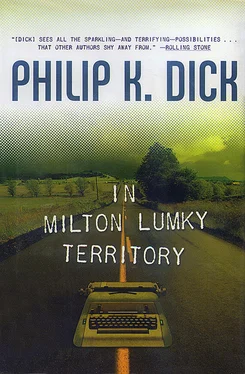Philip Dick - In Milton Lumky Territory
Здесь есть возможность читать онлайн «Philip Dick - In Milton Lumky Territory» весь текст электронной книги совершенно бесплатно (целиком полную версию без сокращений). В некоторых случаях можно слушать аудио, скачать через торрент в формате fb2 и присутствует краткое содержание. Город: New York, ISBN: , Издательство: Tom Doherty Associates, LLC, Жанр: roman, на английском языке. Описание произведения, (предисловие) а так же отзывы посетителей доступны на портале библиотеки ЛибКат.
- Название:In Milton Lumky Territory
- Автор:
- Издательство:Tom Doherty Associates, LLC
- Жанр:
- Год:неизвестен
- Город:New York
- ISBN:978-0-7653-1695-0
- Рейтинг книги:4 / 5. Голосов: 1
-
Избранное:Добавить в избранное
- Отзывы:
-
Ваша оценка:
- 80
- 1
- 2
- 3
- 4
- 5
In Milton Lumky Territory: краткое содержание, описание и аннотация
Предлагаем к чтению аннотацию, описание, краткое содержание или предисловие (зависит от того, что написал сам автор книги «In Milton Lumky Territory»). Если вы не нашли необходимую информацию о книге — напишите в комментариях, мы постараемся отыскать её.
In Milton Lumky Territory — читать онлайн бесплатно полную книгу (весь текст) целиком
Ниже представлен текст книги, разбитый по страницам. Система сохранения места последней прочитанной страницы, позволяет с удобством читать онлайн бесплатно книгу «In Milton Lumky Territory», без необходимости каждый раз заново искать на чём Вы остановились. Поставьте закладку, и сможете в любой момент перейти на страницу, на которой закончили чтение.
Интервал:
Закладка:
This house now did not resemble that fine stone mansion with its trees, fountain, fish pool and bird bath, its outdoor sprinkling system. In those days, she had been single and she had shared the house with three other women. They did not own it; they only rented it. This house, smaller, stuck up square and regular, wood, not stone. The windows were small. The yard, in front, had no trees in it, only a few bushes, flowers, no grass at all. The steps were brick. But it was a modern house, in good condition, and he saw that behind it a long grassy yard stretched out, flat and well-kept, with what appeared to be a ping pong table in the middle of it, and roses growing up into an arbor… The house had recently been painted a pleasant off-white. Dried drops of paint on the leaves of the shrubs suggested that the job had been done during the last month or so.
He closed and locked the car door, crossed the sidewalk, and then stepped up to the porch and rang the bell before he could have time to suffer any further doubts.
Nobody answered the ring. He rang again.
Off somewhere within the house a radio could be heard, tuned to a program of dance music. After waiting and ringing, he walked back down to the path and around the side of the house, through an open gate and into the back yard.
At first the garden seemed empty. He started back toward me front again, and then he saw Susan Faine; motionless, she blended with the garden. She sat on the back step, with a lap of brightly-colored clothes; apparently she had been darning or sewing, because on the step beside her lay a pair of scissors and a number of spools of thread. What she had were children’s socks. And now he noticed toys strewn about the yard, a rusted metal horse, blocks, parts of games. Susan had on a white frilly blouse, short-sleeved, and a great long unpressed wrinkled green skirt of some thin material that whipped about her legs each time a breeze moved through the yard. Her legs and arms seemed unusually white. Her feet were bare, but he saw a pair of canvas shoes that had been kicked off, nearby.
If she had been darning socks she certainly had stopped, now. She sat bent over, with one red sock across her right wrist and hand, her fingers inside it. A thimble sparkled from the second finger of her left hand. But he saw no sign of needle or thread.
“Where’s your needle and thread?” he said.
She lifted her head. “What?” she said slowly, squinting at him to see who it was. Her movements were retarded, as if she had been almost asleep. “Oh,” she said. “It’s you.” Reaching down, she brushed her fingers across the ground at her feet. “I dropped it,” she said.
As he approached, she found her needle, held it up and inspected it, and then resumed her darning. The bright midday sunlight made her frown; lines scoured her forehead, and her eyes, fixed on the dazzling sock, became almost shut.
“I have a lot of stuff for you,” he said, balancing his armload.
Again she raised her head.
“From your office.” He held out the armload.
“Did Mrs. de Lima give them to you?” Susan said.
“That woman who was there,” he said. “Middle-aged, brown hair.”
“I told her I wasn’t feeling well,” Susan said. “I really ought to be down there. I haven’t been down there more than one day in the last month.”
“Don’t go down if you’re not feeling well,” he said.
“I feel okay,” she said. “I just can’t bring myself to go down there. It’s so depressing. I’m just not cut out to be a businesswoman. I used to teach school.”
He nodded at that.
Susan sighed. “Put them inside. The checks and the mail. What’s that big packet?”
“A manuscript.” He related to her the details that Mrs. de Lima had asked him to pass on.
Susan put down her lap of socks and got to her feet. “I know what she wants; she wants me to type it here at home. She knows I have an Underwood electric here. I suppose I should. What’s the matter with me? I shouldn’t make her do all the work…she’s really been very good about it, the last month. Come on in. Excuse me for being so slow… I can’t seem to focus on anything today.” She disappeared on inside the house, and he followed.
The back porch, with its laundry tubs and shelves, was cool. Susan had gone on into a yellow, brightly-decorated kitchen, and then on along a hall and into a front room. When he arrived there he found her collapsed in a deep, old-fashioned easy chair, her arms resting on its fuzzy, black-fabric arms, her head back, eyes fixed on the ceiling.
Setting his armload down on a table he said, “I was surprised when she gave me this stuff.”
“Why?” Susan said, her eyes shut.
“She doesn’t know me.”
“Poor Zoe,” Susan said. “She’s a nut. She trusts everybody. She’s as bad as I am. Neither of us have any business sense. I don’t know how we ever got started.”
“Anyhow you’re making a living,” he said.
“No,” she said. “We’re not making a living—Bruce? Is that your first name? The thing that depresses me is that now is when I really can use a source of income. And that’s what it isn’t.”
He asked, “Who owns the toys I saw out back?”
“Taffy,” she said. “My daughter. She’s in school. Second grade.”
He had an impulse, at that moment, to tell her that she had been his teacher. The message almost came out of him; he stammered a few words and then said instead, “If you were a teacher, why don’t you educate her at home? That seems ideal to me.”
“The group,” Susan said. “A child needs training to prepare him to live with a group. Would you like some coffee?” Arising from her chair she started out of the room.
“No, thanks,” he mumbled. The impulse passed, and, strangely, no intention to tell her remained, no desire at all. Probably he would never get around to telling her; the subject had closed itself for good, leaving nothing behind. Except that he knew. He remembered her, the young woman teacher of those days, who had been there, one morning when they arrived.
In those days, he thought, she probably was twenty-three or—four. Good God, he thought. The age I am now.
Thinking that, he tried to picture her as she had actually been in those days, not as she had looked to him a fifth grade student eleven years old. The image was unclear as it could possibly be. He could shut his eyes and imagine various cronies of the times: Nigger Lips Tate, Bud McVae, Earl Smith, Louis Selkirk, the kid in the apartment house across the street who had pantsed him one afternoon in plain sight of everyone, the girl who sat across from him in class and who had the long black hair and whom Gene Scanlan had written the note to, for him, which old Mrs. Jaffey, their former teacher, had happened on and—thank God—been unable to read. All that was still visible to him, but when he thought about her, about Miss Reuben, he saw only a tight-faced woman, with angry eyes and pale, twitching lips, who stood very tall with her arms folded, at the front of the room, wearing a blue suit with huge buttons like campaign badges, only white. And the carrying-power of her voice, especially on the playground during recess; she had stood up on the ramp by the door to the building supervising them, wearing a heavy coat over her shoulders. She had come out to Idaho from Florida, and she was not accustomed to the cold. In the winter and first months of spring she had shivered and complained, even to them, and her face had been drawn and pinched, her lips tucked in almost out of sight. In class she talked constantly about Florida and how wonderful the climate there was, the oranges and lemons, the beaches. They had all listened. They were obliged to.
From the first day, he had been frightened of her. All of them had seen that she was a mean, intense young woman, simmering with strength, quite different from old Mrs. Jaffey, who had been ill and who had gone downstairs to the nurse one day, in the middle of the afternoon, and who had not come back. For months Mrs. Jaffey had complained of weariness and fever. After she had left the room, the children began screaming and hurling erasers. They had a fine time until the Principal appeared and hushed them up. And then, a few days later, they had arrived at their classroom to find Miss Reuben.
Читать дальшеИнтервал:
Закладка:
Похожие книги на «In Milton Lumky Territory»
Представляем Вашему вниманию похожие книги на «In Milton Lumky Territory» списком для выбора. Мы отобрали схожую по названию и смыслу литературу в надежде предоставить читателям больше вариантов отыскать новые, интересные, ещё непрочитанные произведения.
Обсуждение, отзывы о книге «In Milton Lumky Territory» и просто собственные мнения читателей. Оставьте ваши комментарии, напишите, что Вы думаете о произведении, его смысле или главных героях. Укажите что конкретно понравилось, а что нет, и почему Вы так считаете.










